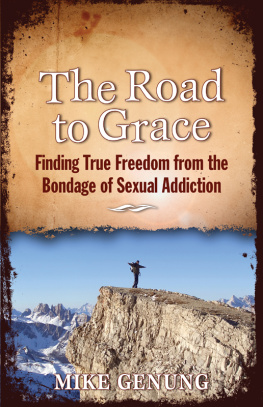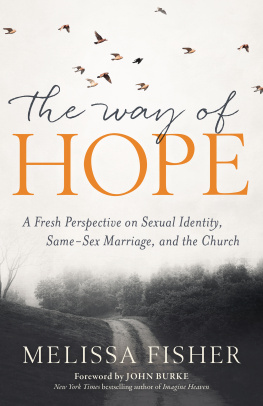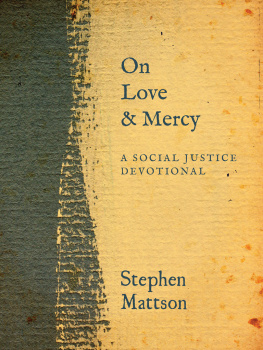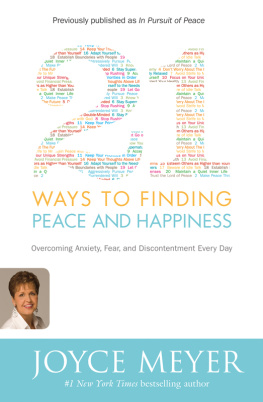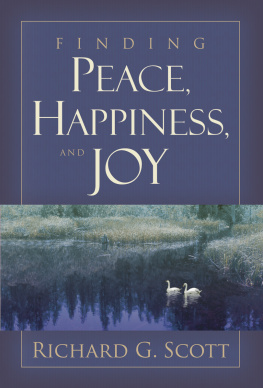WHY I DONT CALL MYSELF GAY
DANIEL C. MATTSON
WHY I DONT
CALL MYSELF
GAY
How I Reclaimed My Sexual Reality
and Found Peace
IGNATIUS PRESS SAN FRANCISCO
Unless otherwise noted, Scripture quotations (except those within citations) have been taken from the Revised Standard Version of the Holy Bible, Second Catholic Edition, 2006 by the Division of Christian Education of the National Council of the Churches of Christ in the United States of America. All rights reserved.
Excerpts from the Catechism of the Catholic Church , second edition, 2000 by Libreria Editrice Vaticana-United States Conference of Catholic Bishops, Washington, D.C. All rights reserved. Used with permission.
Quotations from English translations of papal documents are from the Vatican website (w2.vatican.va) Libreria Editrice Vaticana. All rights reserved. Used with permission.
Quotations from Thomas Merton, No Man Is an Island , copyright 1955 by The Abbey of Our Lady of Gethsemani and renewed 1983 by The Trustees of Merton Legacy Trust. Published by Harcourt, Brace and Co. Reprinted by permission of Curtis Brown, Ltd. and Houghton Mifflin Harcourt Publishing Company. All rights reserved.
Cover design by John Herreid
2017 by Ignatius Press, San Francisco
All rights reserved
ISBN 978-1-62164-072-1 (PB)
ISBN 978-1-68149-771-6 (EB)
Library of Congress Control Number 2016956073
Printed in the United States of America
To my godparents, Robert and Susan Cavera,
whose prayers helped bring me home.
We owe a definite homage to the reality around us, and we are obliged, at certain times, to say what things are and to give them their right names and to lay open our thought about them to the men we live with.
Thomas Merton, No Man Is an Island
About sex especially men are born unbalanced; we might almost say men are born mad. They scarcely reach sanity till they reach sanctity.
G.K. Chesterton, The Everlasting Man
The Lord Jesus promised, You shall know the truth and the truth shall set you free.
Congregation for the Doctrine of the Faith,
Letter to the Bishops
of the Catholic Church on the Pastoral
Care of Homosexual Persons
CONTENTS
Part One
The Prodigal and His Return
Part Two
Reclaiming Reality
Part Three
How to Run the Race: Living Out
the Daily Battle for Chastity
Part Four
A Miscellany: Reflections on the Catechism ,
Friendship, and Loneliness
Part Five
The Most Important Things
FOREWORD
Sanctified in the Truth
In October 2015, two days before the Synod on the Family began, I participated in a conference at the Pontifical University of St. Thomas in Rome, sponsored by Courage International, Ignatius Press, and the Napa Institute. The conference was entitled Living the Truth in Love, which considered pastoral approaches to men and women who experience homosexual tendencies. I gave a presentation and afterward listened to lectures about Christian anthropology and the Churchs norms for pastoral care.
Then I heard talks unlike any I had ever heard before, from three men and one woman who experience same-sex attractions (SSA). Their testimonials moved me deeply. In each case, they recounted how they lived a homosexual life, but then had a change of heart. Their stories were not sentimental. They did not gloss over their struggles with superficial or insincere expressions of piety. On the contrary, with evident humility and courage, they opened their hearts to the audience in a sincere and compelling way.
I came to learn how these four souls suffered, sometimes because of circumstances beyond their control, and sometimes because of their own choices. I sensed the loneliness, pain, and unhappiness they endured as a result of pursuing a life contrary to their true identity as Gods children. In time, however, their suffering became an occasion for grace, for they came to know the Lord and the beauty of the teachings of his Church. Only when they lived in keeping with Christs teaching were they able to find the peace and joy for which they had been searching. They still encounter the Cross. Their lives are not easy or without sadness. But now, with the help of the Church, they are living the truth of the Gospel and the peace it bringsin the Sacraments and in prayer, in chaste Christian friendship, and in the hope of the Crucified and Risen Savior.
We are frequently reminded by bishops and priests that the Catechism states that men and women who experience SSA must be accepted with respect, compassion and sensitivity, and that the homosexual tendency constitutes for most of them a trial ( CCC 2358). For me, the four speakers put a face on the topic of homosexuality, so I can better testify to the Churchs wisdom in providing these valuable words in the Catechism .
Yet in her maternal charity and wisdom, the Church indicates several other things in the Catechism about homosexuality that some members of the clergy choose not to quote, including the clear warning: under no circumstances can [homosexual acts] be approved ( CCC 2357). The respect and sensitivity to which the Catechism rightly calls us does not give us permission to deprive men and women who experience SSA of the fullness of the Gospel. To omit the hard sayings of Christ and his Church is not charity. Indeed, it is a disservice to the Lord and to those created in his image and likeness and redeemed by his Precious Blood. We cannot be more compassionate or merciful than Jesus, who told the woman caught in adultery two equally important messages: Neither do I condemn you; go, and do not sin again (Jn 8:11).
People who have homosexual tendencies are called to fulfill Gods will in their lives and, if they are Christians, to unite to the sacrifice of the Lords Cross the difficulties they may encounter from their condition ( CCC 2358). They are called to chastity, and we demean them if we think they cannot attain this virtue, which is a virtue for all disciples. Like all members of the Church, they can and should gradually and resolutely approach Christian perfection, the vocation of all the baptized ( CCC 2359). These words of the Catechism are equally valuable, because they express authentic pastoral charity. They invite us, as members of Christs body, to accompany our brothers and sisters who experience SSA, as they seek to achieve the Christian perfection to which the Lord calls all of his children. Jesus does not ask anything from us that is impossible or for which he does not supply the grace. It is the Church that is the source of this grace.
The Church faces many challenges and threats today. For that reason, the unity for which our Lord so urgently prayed (cf. Jn 17:21) is imperative, especially among the clergy. Jesus prayed that his priests would be sanctified in the truth (Jn 17:17). We can only be holy, and lead others to holiness, to the degree that we allow ourselves to be consecrated in truth (Jn 17:19).
I encourage many to read the following testimonial, which, like the four that edified me, bears witness to the mercy and goodness of God, to the efficacy of his grace, and to the veracity of the teachings of his Church. Voices like these are seldom heard in the discussion surrounding pastoral care for those with SSA. I especially encourage my brother bishops and priests to read this book, which I trust will deepen their conviction that the wisdom of the Church in this difficult and sensitive area expresses genuine love and compassion.
You are my friends if you do what I command you, Jesus said. (Jn 15:14). Only Christ can heal the wounds of sin and division. Only the Church has the answers to mans deepest questions and his deepest needs for love and friendship. Only the fullness of the Gospel fulfills the human heart. Only the commandments mark the path to friendship with Christ, and with one another, for Gods commandments are not burdensome (1 Jn 5:3).
Next page


